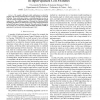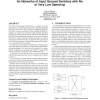5 search results - page 1 / 1 » Stability of Maximal Size Matching Scheduling in Input-Queue... |
ICC
2000
IEEE
13 years 9 months ago
2000
IEEE
— We consider cell-based switch architectures in which the speedup of the internal switching fabric is not large enough to avoid input buffering. These architectures require a sc...
INFOCOM
2003
IEEE
13 years 10 months ago
2003
IEEE
— Input Queued(IQ) switches have been very well studied in the recent past. The main problem in the IQ switches concerns scheduling. The main focus of the research has been the �...
CCR
2006
13 years 5 months ago
2006
The delay and throughput characteristics of a packet switch depend mainly on the queueing scheme and the scheduling algorithm deployed at the switch. Early research on scheduling ...
TCOM
2008
13 years 4 months ago
2008
Abstract-- Input-queued cell switches employing the oldestcell-first (OCF) policy have been shown to yield low mean delay characteristics. Moreover, it has been proven that OCF is ...
IEICET
2006
13 years 5 months ago
2006
ng problem for the SDMG CIOQ switch is abstracted as a bipartite k-matching problem. Using fluid model techniques, we prove that any maximal size k-matching algorithm on an SDMG CI...


